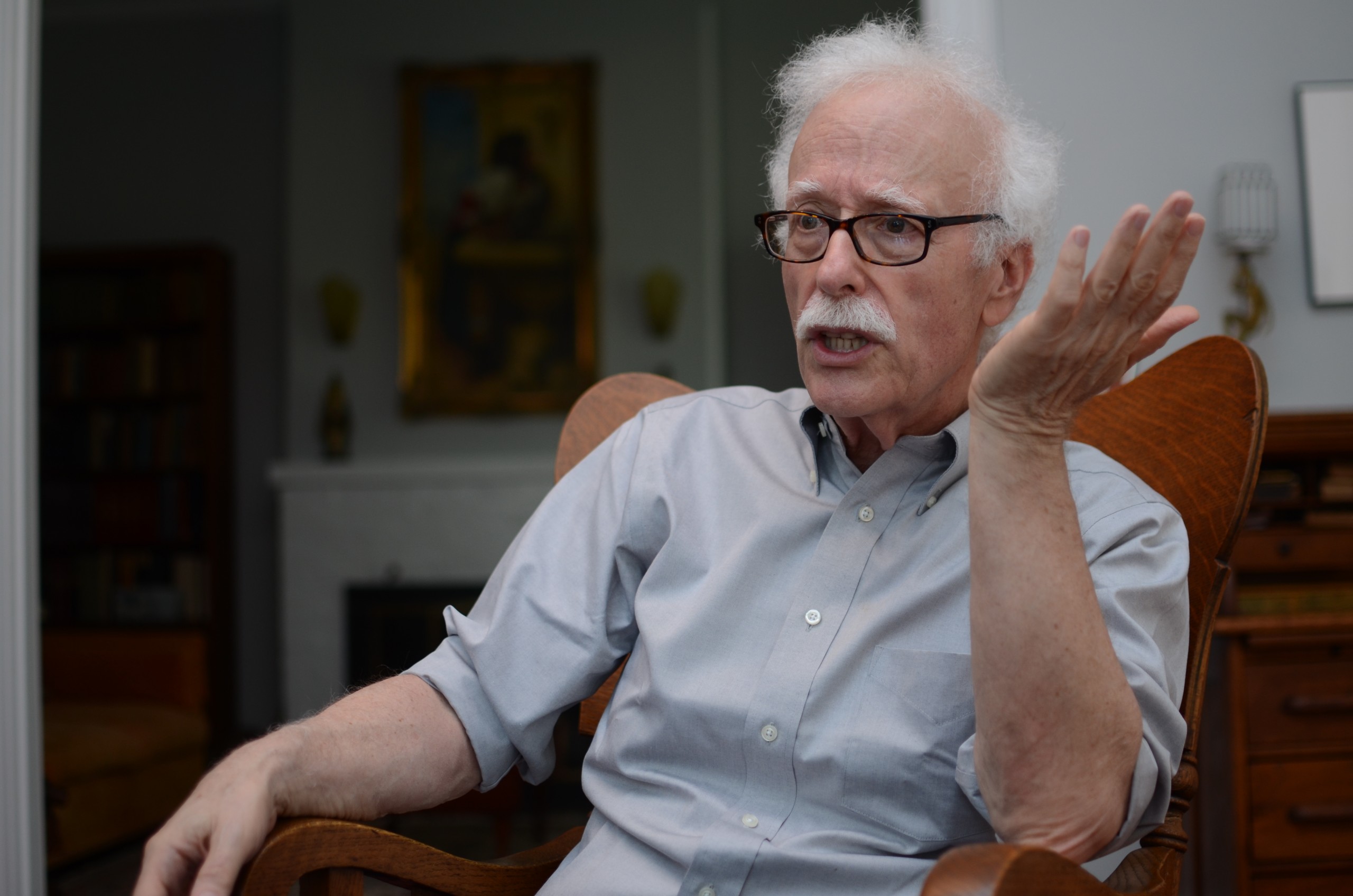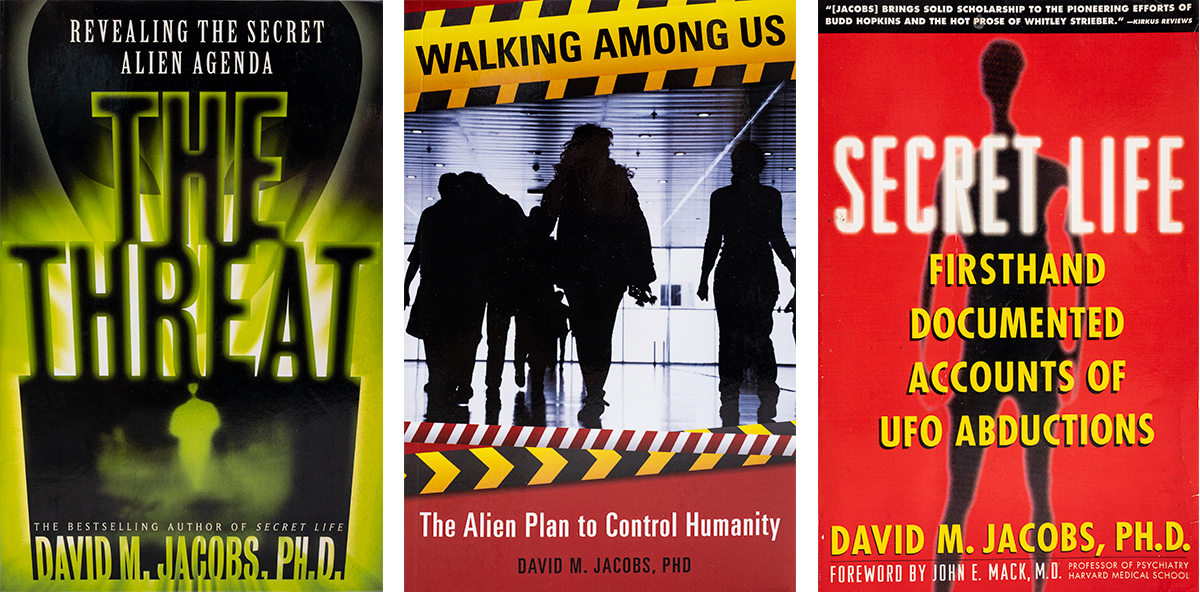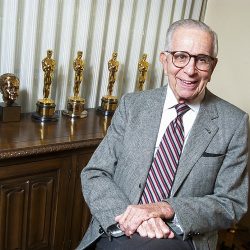
Aliens among Us
According to this UFO researcher, the extraterrestrials aren’t coming. They’re already here.
He’s never seen an unidentified flying object. He’s never had an alien encounter. But for most of his career, 78-year-old David Jacobs MA’68, PhD’73 has been one of the country’s foremost UFO experts. Even before he earned his PhD — only the second doctorate awarded anywhere on a UFO-related topic — he was fascinated by tales of strange disappearances, hovering objects in the sky, and alien creatures with big eyes and no mouths.
And he’s hardly alone: America’s captivation with extraterrestrial life is well documented. From the Life magazine feature story in 1952 that first piqued Jacobs’s interest to a 2020 documentary in which former Senate majority leader Harry Reid claims the U.S. government has been covering up UFOs for 70 years, mainstream media continue to unearth alleged evidence that feeds our enduring question: is there life out there?
It seems we want to believe almost as badly as we don’t.
Jacobs, who’s been both ridiculed and revered, is long past the question of believing. Retired since 2014 after 40 years as a history professor at Temple University, he spent decades using hypnotherapy to interview people who claim they’ve been abducted and experimented on by aliens. He’s heard too much that he can’t explain away. Too many details that match across strangers, too many shared experiences to chalk up to coincidence.
“If it’s not happening, it’s astounding. If it is happening, it’s astounding. Because it’s global,” Jacobs says from his home in Philadelphia, where his sons are in town helping pack up the family house for sale. Jacobs, a widower now, is downsizing to an apartment (a “senior hotel,” he chuckles) in Evanston, Illinois. “Everybody around the world basically says the same thing. There’s never been anything like it. Whether it’s real or not, there’s never been anything like it.”
Jacobs’s voice over the phone is friendly, warm, and excitable — but notably sad. He often pokes fun at himself, not only for the subject matter, but the way age is stealing his memory — ironic, since he spent so many years helping alleged abductees recover theirs. “My brain has shrunk to the size of an acorn,” he jokes, but then, he’d just as soon forget some of what he’s learned anyway. Because he’s come to the conclusion that not only are alien beings real, they’re abducting and performing medical procedures on humans for a grim reason: to create a hybrid species and colonize the planet.
“This is the really, really crazy part,” he says, laughing. He wishes it weren’t true. He knows it sounds completely nuts. But hear him out.
Jacobs grew up at a time when America and Russia were racing to put a man on the moon, but he wasn’t the type of kid drawn to science fiction. It wasn’t until college in the late 1960s that America’s burgeoning obsession with unidentified flying objects began to capture his imagination. All around the country, beginning in earnest with 1947’s infamous Roswell incident but continuing throughout the 1950s and ’60s, thousands of people reported spotting “flying saucers” in the sky, often in clusters, and particularly near military bases.
These mysterious sightings dominated headlines. An archival search of U.S. newspapers for UFO between 1947 and 1969 brings up 40,164 hits — 2,558 in Wisconsin alone. By 1966, Jacobs had arrived at the University of Wisconsin campus to pursue a graduate degree in U.S. history, and he read these accounts with increasing interest.
That same year, the U.S. Air Force, concerned with national security and investigating claims with an effort called Project Blue Book, took in 1,112 UFO reports from around the country. It also presented the 1,400-page Scientific Study of UFOs report to Congress, claiming that most — but not all — sightings could be explained away by phenomena such as tricks of light, weather balloons, and swamp gas. Project Blue Book officially ended in 1969, but the sightings didn’t wane. Other groups continued to take reports, such as the Aerial Phenomena Research Organization in Arizona and the National Investigations Committee on Aerial Phenomena. Jacobs began collecting reported sightings from Wisconsin for both.
“There were several cases that were just astonishing,” he says, including the first he ever sent: a young couple out for a boat ride on Lake Monona in September 1970 who saw a strange, silent object hovering 50 feet above the boat landing, tracking them with its lights. “I don’t know what it was. But I’ve never seen anything like it in my life,” the woman told the Capital Times. “I’m still scared thinking about it.” She reported the sighting to the Monona police, who brushed it off.
This seemed a familiar pattern to Jacobs. Ordinary people witnessing extraordinary things, who were then dismissed. It was this topic — not whether UFOs were real, but how reports were handled by government authorities — that Jacobs took on for his doctoral dissertation in 1973. A revised version, The UFO Controversy in America, was published by Indiana University Press in 1975 and sold out its first printing. A later edition included a foreword by J. Allen Hynek, who’d headed Project Blue Book.
“I was interested in the UFO phenomenon, not so much the abduction phenomenon. To me, that was nuts,” Jacobs says. He finished his PhD at UW–Madison and, after a brief stint at the University of Nebraska, he moved to Philadelphia to take a position at Temple. There, he taught U.S. history classes for 40 years — the most popular of which, by far, was his perpetually wait-listed UFOs in American Society.
Meanwhile, 100 miles to the north in New York, a man named Budd Hopkins was gaining attention for his hypnosis work with people who claimed to have been abducted by aliens. The two men were introduced through a mutual friend — famous crooner Mel Tormé’s son, Tracy, Jacobs recalls with a laugh — and in 1986, after several years researching, training, and observing Hopkins’s work, Jacobs began utilizing hypnotherapy to conduct interviews himself. Over the next five years, he conducted 325 hypnosis sessions with more than 60 abductees, each of whom sought him out. They came from all walks of life — a lawyer, a teacher, a reporter, a professional cyclist, “by and large average citizens who did not desire publicity.”
All claimed to be haunted by the vague sense that something had happened to them that they couldn’t quite recall, like a dream slipping away. Many displayed signs of trauma, even posttraumatic-stress disorder. Under hypnosis, they each recalled being abducted by strange-looking beings and subjected to a variety of medical procedures, and their stories shared commonalities such as floating through a closed window or lying unable to move on an exam table.
“Often they would describe abduction events that I had heard perhaps a hundred times and then look at me and ask, ‘Has anybody ever said anything like that to you before?’ ” Jacobs wrote in his second book, Secret Life: Firsthand Documented Accounts of UFO Abductions, published in 1993 by Atria. It meticulously details 13 cases from those first five years of interviews. Wrote Jacobs, “The material is inherently unbelievable, and I assume that many readers will be skeptical of it.” He said he would not attempt to build a case for their reality, but simply document the accounts into a coherent whole for the reader to make up his or her mind.
As it turns out, this was only the beginning. Over the next 30 years, Jacobs would go on to investigate more than 1,000 abduction events with more than 150 abductees. He wrote three more books and appeared as an expert source in dozens of articles and movies. His hypnotherapy interviews — and the conclusions he drew from them — became increasingly hard to believe, and increasingly dark. He never took any money for the sessions, and he says most abductees didn’t want anyone to know what they’d been through. Jacobs’s work was often met with disbelief or outright ridicule — hypnotherapy holds as much weight with many people as aliens — but he says he had no reason to make anything up, and eventually, he began to hate what he was finding.
“It’s something I never would have imagined when I first started,” Jacobs says. Abductees began to describe seeing a sort of hybrid creature, part human, part alien, being taught how to do basic human tasks such as drive a car or shop for groceries. Jacobs came to believe that aliens were using abduction reproductive procedures to create a new species, intermingling with humans in everyday life with eventual plans to colonize planet Earth. “I learned to really dislike this thing,” he says. “This is horrible; it’s terrible, but it’s real.”
He expounded on these findings in his next three books: 1999’s The Threat: Revealing the Secret Alien Agenda, 2000’s UFOs & Abductions: Challenging the Borders of Knowledge, and his final book, published in September 2015, Walking Among Us: The Alien Plan to Control Humanity. By that time Irene, his wife of more than 50 years, was in the final stages of her battle with cancer. Their grown sons had successfully left the nest, and Jacobs was tired.
“I decided that was it for me — I’ve done as much as I can do. I don’t know if I can do any more in the UFO abduction phenomenon,” he says, the sounds of moving continuing to bustle in the background. “I can see the progression of what’s been happening over the decades, and enough is enough. I want to be rid of it now.”
Jacobs may be done with it, but the rest of Earth doesn’t seem to be. The UFO debate is not only alive and well, it’s enjoying a resurgence. In October 2020, pop singer and actress Demi Lovato posted on Instagram that she uses a new smartphone app called CE5 Contact to talk to aliens, which she credits with helping her to get over a recent breakup. It sounds like great fodder for late-night comedy hosts. But harder to dismiss is a compelling new documentary called The Phenomenon that features a lineup of credible government officials claiming a long history of UFO cover-ups.
The film interviews the New York Times investigative journalist who broke the 2017 whistleblower story revealing the existence of a secret Pentagon UFO program. Called Advanced Aerospace Threat Identification Program, it began under the elder Bush administration and continued through Donald Trump’s first year. The story was confirmed in April 2020 by the U.S. Department of Defense, which released video encounters between U.S. Navy fighter jets and a UFO with maneuverability that some pilots describe as defying the laws of physics.
“Everything we know about and have learned about mankind and its place in the universe suggests that we [intelligent life] are part of the norm — we are not the exception,” said Christopher Mellon, former U.S. deputy assistant secretary of defense, in the documentary. “We need to begin to prepare to accept and understand that we are not alone in the universe, have not been at all — throughout [all] time.”
Still, the idea that hybrid aliens are walking among us as part of a master colonization plan seems a step too far — doesn’t it? It’s much easier to entertain the idea that we are not alone in a universe containing billions of galaxies. But if one accepts the possibility of intelligent life beyond Earth, Jacobs says, how difficult is it to believe those creatures might seek us out the way we have sought them out?

David Jacobs wrote about UFOs for his UW–Madison doctoral dissertation and later taught a popular class on them as a professor at Temple University. The Philadelphia Inquirer
The whole alien-takeover thing aside, Jacobs reflects that it’s been a good life. Moving to Evanston is a major change, but it’s still a university town, with nearby Northwestern and a massive library only a couple of blocks from his new home. The lake is in walking distance, as are restaurants and a cinema.
“I’ll be plenty happy there,” Jacobs says, and he was happy in Philadelphia. Nebraska was okay. “But let me just say, I loved Wisconsin every minute I was there, from beginning to end. I had wonderful professors, and everybody was really nice. Madison was just terrific.”
It seems like a galaxy far away, but Jacobs fondly remembers the lakes and his little ramshackle apartment on the isthmus. He marched against the Vietnam War and recalls the Sterling Hall bombing. When he hears about Madison’s antiracism protesters marching after the death of George Floyd, he exclaims, “Good! Good for them!”
These days, when the darkness creeps in, he escapes into Netflix. One of his favorite classes to teach was U.S. History through Film, and he still loves thinking about the role of television in popular culture.
“I don’t watch a lot of stuff about UFOs on television, though. I try to avoid that now,” he says. “I need to lead a happy life.” •
Maggie Ginsberg ’97 is an associate editor of Madison Magazine, a novelist, and a longtime contributor to city, regional, and national magazines.
Published in the Summer 2021 issue





Comments
Boghos L. Artinian June 28, 2023
When we inject blood into your veins from an unrelated person your cells would not notice the ‘alien’ cells that made an entrance into their environment! This is a homology of ‘aliens unnoticed among us’, at the cellular level.
Keagan williams-Salgado February 3, 2026
I had a close encounter in 2017 (as low as 20 ft altitude) and know how these are propelled,(plasma pulse drive/MHD?) I also have had reoccurring phenomena since I made a social media profile specifically to release data, but more as a way of keeping a journal.
These are inter-dimensional at the conscious level and the craft I encountered is itself alive/sentient and had no occupants. Just a living drone basically, I also know what they are called (poitazoids) via 2nd encounter (auditory intrusion/transmission) in a mechanical computer-ish voice .
This is based off only my personal encounter dataset , no outside data is used, because if different craft have different purposes it would be of no use and negatively affect my research .
Feel free to reach back otherwise I will just continue to work on this by myself. I just want to be able to apply my dataset in a way that is actually meaningful, I truly should be in a lab.